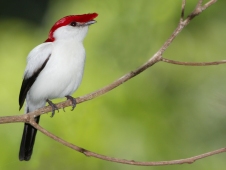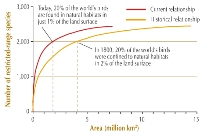
Analyses show that 20% of the world’s birds occur in a less than 1% of the world’s land area. Focusing conservation resources and actions within a relatively small area can therefore help to conserve an important component of the Earth’s terrestrial biodiversity.

A ‘species/area’ curve of the numbers of restricted-range landbirds and the area that they occupy shows that, historically, the 2,451 restricted-range species that are endemic to the 218 EBAs (c.25% of all species), were confined to c.14.5 million km2 (c.10% of the world’s land area), while 2,000 (c.20%) were confined to c.4 million km2 (c.2%). Today, the same restricted-range species are present in only c.7.3 million km2 of remaining natural habitat (c.5% of the world’s land area; approximately the size of Australia) and c.20% occur in a total of less than 2 million km2 (c.1%) (Stattersfield et al. 1998; see figure). These findings show that focusing conservation resources and actions within a relatively small area can help to achieve the conservation of a major part of the Earth’s terrestrial biodiversity.
References
Compiled: 2004 Last updated: 2008
Recommended Citation:
BirdLife International (2008)
Restricted-range bird species occur in just 5% of the Earth's land surface.
Downloaded from https://datazone.birdlife.org/sowb/casestudy/restricted-range-bird-species-occur-in-just-5-percent-of-the-earths-land-surface on 22/12/2024